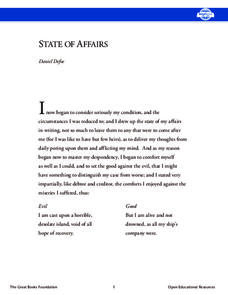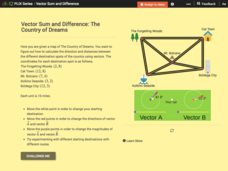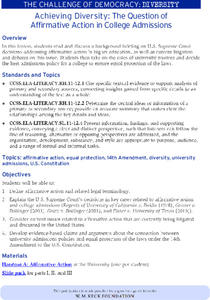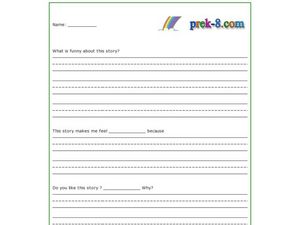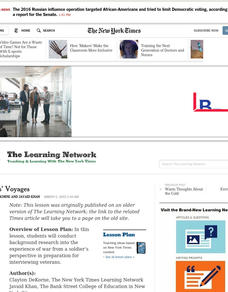Curated OER
Pride and Prejudice: Question Answer Relationship Strategy
Help middle and high school readers access the text with a series of question-answer relationship (QAR) strategies. Using Jane Austen's Pride and Prejudice as an example, the resource prompts learners to ask and answer questions using...
TED-Ed
How Languages Evolve
Do all languages have a common ancestor? Although no one yet knows the answer to that big question, the narrator of this short, animated video explains how linguists use migration patterns, geological features, and word clues to...
Media Smarts
Facing TV Violence: Consequences and Media Violence
Make your class aware of the difference between media violence and real violence. Using prior knowledge, a video clip, and a worksheet, class members explore and discuss the unrealistic portrayal of violence in the media. Learners...
Curated OER
34x25x36: Advertising and Body Image
Point of View’s short film, “34x25x36” launches a study of how images presented by mannequins and advertisements influence body image. Class members read and discuss the fact sheet "Media's Effect on Girls: Body Image and Gender...
Curated OER
Exploring Emotions Through Activities
You'll definitely want this rich compilation of worksheets and activities in your toolbelt as you review and discuss the range of emotions we have as human beings. Activities include defining feelings, identifying ways we express...
NASA
What’s the Problem with Isotropy?
Some patterns are so small, we can't see them without the help of technology. The same is true for cosmic microwave background radiation. During this activity and discussion, scholars examine both anisotropic and isotropic items and...
Channel Islands Film
Dark Water: Lesson Plan 2 - Grade 3
A discussion of bioluminescence launches an investigation of animal adaptations. After re-watching the opening minutes of Dark Water, class members listen to a reading of What Do You Do with a Tail Like This, and then create a new animal...
Great Books Foundation
State of Affairs
Good verses evil. Scholars make inferences after taking a close look at the short story, State of Affairs, in which Daniel Defoe goes back and forth comparing good and evil thoughts through his writing. After reading the text, there are...
Academy of American Poets
Teach This Poem: "Spring is like a perhaps hand" by E. E. Cummings
E. E. Cummings' "Spring is like a perhaps hand" offers young scholars an opportunity to try their hands at analyzing a simile. After a warm-up activity and a close reading of the poem, class members discuss what they think the poem is...
EngageNY
Grade 9 ELA Module 1: Unit 3, Lesson 11
The study of Romeo and Juliet continues as pairs use the provided summary tool worksheet to record evidence of how Shakespeare uses dramatic irony to heighten the tension in Juliet's soliloquy in Act 3, scene 2, lines 1–31.
Acoustical Society of America
Sound Measures
How loud is the class's hearing threshold? Using a sound level meter, the class members observe how the loudness of sound is affected by distance. Learners continue to study decibels by seeing how different sounds compare to each other...
PBS
Out of the Shadows | Black America Since MLK: And Still I Rise
Two powerful video clips launch a study of race relations in the United States after the Selma, Alabama riots, the passage of the Votings Rights Act, and the riots in Watts, California.
Curated OER
Student Opinion: What Small Things Have You Seen and Taken Note of Today?
An interesting and unusual topic for a news article, this resource from the New York Times website asks learners to take a moment and consider all the things they notice during a typical day. Based of the editorial piece "Things I Saw"...
PBS
Blue Ribbon Readers: Questioning
Model for your class how to become a better reader through questioning. After conducting a picture walk that introduces prediction strategies, learners play an interactive questioning cube game. Complete directions for the game and...
CK-12 Foundation
Vector Sum and Difference: The Country of Dreams
Find your way around using vectors. Scholars use an interactive to learn about vector addition. They answer a set of questions about modeling a route on a map using vectors.
Constitutional Rights Foundation
Achieving Diversity: The Question of Affirmative Action in College Admissions
How can a college board of trustees both increase cultural and racial diversity and offer all incoming learners equal protection under the Fourteenth Amendment? Class members debate the question using readings about how colleges use...
Penguin Books
The Discussion Guide to the Inaugural Poem: The Hill We Climb by Amanda Gorman
National Youth Poet Laureate Amanda Gorman's "The Hill We Climb," featured at the 2021 inauguration of President Joseph Biden, is the focus of a six-page guide. The guide includes before reading, during reading, and after reading...
Curated OER
Discussion Questions for Amber Bechtel's Essay on AIDS in South Africa
Young scholars read an essay by Amber Bechtel on the situation of AIDS in South Africa. After reading, they participate in a class discussion answering questions posed by their teacher. To end the lesson, they reflect on the situation in...
Curated OER
Discussion: The Arts
In this discussion about the arts worksheet, students ask and answer questions concerning the arts and support of the arts.
Curated OER
Story Questions
In this worksheet, writers respond to three short-answer questions. Explain what is funny in the story, how the story makes them feel, and whether they liked the story. This is a great resource to send home for independent reading or to...
Curated OER
Tchoukball - Lesson 1 - Introduction, Basic Rules and Skills
What is Tchoukball? Never heard of it? Take a look at this unit and see if it's something worth teaching to you class. It could be fun to learn a new non-traditional sport. Pretty much all you need to know is here in this unit. Lesson 1...
Florida Center for Reading Research
Dictionary Cube
Young scholars investigate new vocabulary words with a fun, collaborative activity. Given a deck of word cards, pairs of students flip over one at a time and independently look up the term in a dictionary. They then take turns rolling a...
Curated OER
Veterans' Voyages
Introduce your middle and high schoolers to a different perspective on war: that of soldier's. Read Guisseppi Ungaretti's poem "Vigil" to kick-start this lesson. After discussing his perspective, read "The Screaming Eagles Fly to the...
Facing History and Ourselves
Life for German Youth in the 1930s: Education, Propaganda, Conformity, and Obedience
The German youth faced an onslaught of propaganda when they went to school, thanks to the Nazi regime led by Hitler during World War II. Pupils relate their education experiences to German youth by analyzing primary source readings,...









